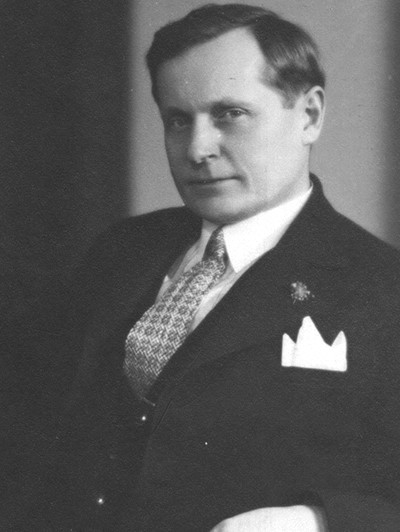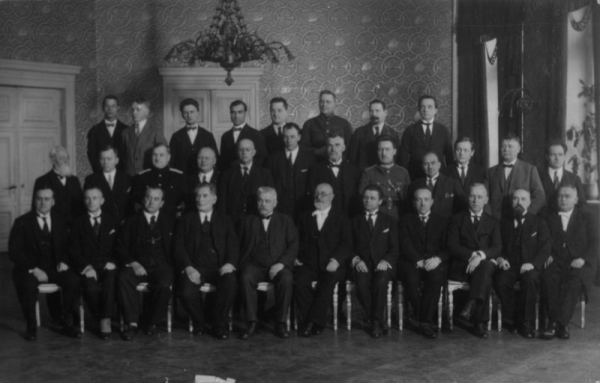Ādolfs Ābele
1889-1967
Composer, conductor, organist, and educator
Adolfs Abele was born on 24 January 1889 in Blome, Valka County, in the so-called Silkite School, in the family of a teacher, organist, choir conductor Oto (Atis) Abele (Oto Ābele) and choir singer Anna Abele (Anna Ābele, née Palmbaha). He studied at Cesis Secondary School (Cēsu reālskola) and acquired his first knowledge of music and piano skills from his parents. An extensive library of sheet music was kept at his home, which was very useful in learning music. After graduating from the secondary school in 1907, he came to Riga where he studied privately with Emils Darzins (Emīls Dārziņš). In 1909, he began his studies at the St Petersburg Conservatoire with L. Homiliuss and Z. Handins (Ž. Handšins). In 1914, he obtained a diploma of organist (pupil), and a year later, in 1915, he completed Jazeps Vitols' (Jāzeps Vītols) composition theory class. During his time at the Conservatoire, he wrote his first compositions, one of which, “Trīs liriskas skices” (Three Lyrical Sketches) for piano, was published in 1912.
After studying, Abele worked for a few years as a war bandmaster and musician in the Latvian Rifle Regiments. In 1918 he was an accompanying pianist at the National Opera, and a year later - in the so-called Balodis Brigade of the Latvian Army. From 1920 to 1924 he lived in Liepaja where he worked as an organist, conductor, and head of the People's Conservatory (Tautas konservatorija). In 1924 he married his student, the organist Otilija Feldmane (Otīlija Feldmane). The marriage lasted 13 years. In 1924 Abele returned to Riga and for the next 20 years taught theory and directed the training of war bandmasters at the Latvian Conservatoire. In 1927, after Alfreds Kalnins (Alfrēds Kalniņš) left for the USA, he also took over the direction of the Latvian University Choir “Dziesmuvara”, conducting it until 1944. The choir became one of the most prominent Latvian choirs and gained international recognition, performing in Estonia, Lithuania, Finland, Denmark, Norway, and Sweden. In 1940, the conductor married the linguist Zinaida Gaile (Zinaīda Gaile), a singer in his choir "Dziesmuvara".
Abele and his wife fled as refugees in 1944. In 1946, they ended up in Germany, Nuremberg, in the so-called Valka camp. Many new choral and solo songs were born there, and he continued organising and leading choirs. Abele was the chief conductor at all five Latvian Song Days of the Franconian Region in 1946, at the Esslingen Song Festival in 1947 and at the Song Day in Fischbach in 1948 commemorating the 75th anniversary of the I Latvian Song Festival.
In 1950 the Abele family moved to the USA, Michigan. At the beginning, Abele was an organist in Allegan but a year later settled in Kalamazoo where he directed the Latvian choir for several years. Abele also served as the principal conductor at the 1st American Latvian Song Festival in Chicago in 1953 and the 2nd American Latvian Song Festival in New York in 1958. He worked in the field of cultural promotion as a board member of the Culture Foundation and as chairman of jury committees in several song festivals and other competitions for new musical pieces.
He received several awards for his services to music and social work: in 1925, 1930 and 1934 he received the Laureate Award of the Culture Foundation, in 1935 the Order of the Three Stars and the Swedish Order of Gustav Vasa, in 1949 the Exiled People’s Award (Trimdas Tautas balva; he celebrated his 60th birthday at Valka camp and received a piano as a gift, so it is considered the first, although unofficial, Exiled People’s Award). In 1955, he received the Cultural Foundation Prize of the American Latvian Association (ALA).
Abele passed away on 2 August 1967, in Kalamazoo, USA. He is buried in the Latvian section of Riverside Cemetery, Kalamazoo.
Information sources
Ādolfs Ābele. (b.g.). https://www.literatura.lv/lv/person/Adolfs-Abele/876107
Otīlija Ābele. (b.g). https://www.literatura.lv/lv/person/Otilija-Abele/876102
Sakss, I. (1968, 1. jūlijs). Profesors Ādolfs Ābele. Latvju Mūzika, 1, 19.-31. Latvju Mūzika, Nr.1 (01.07.1968) (periodika.lv)
Vispārējie latviešu dziesmu svētki. (b.g.). https://www.latviansongfestfund.com/viesparejie-dziesmu-svetki/
Z., Rob. (2000, 1. janvāris). Aizsaulē aizgājušie mūzikas darbinieki. Latvju Mūzika, 28, 3406.–3407. Latvju Mūzika, Nr.28 (01.01.2000) (periodika.lv)



![Ā. Ābeles koris 27.06.1947. gadā Heisbrukas nometnē : [fotogrāfija]](https://dziesmusvetki.lndb.lv/wp-content/uploads/objects/850607/resized/2resized_thumbnail.png)





